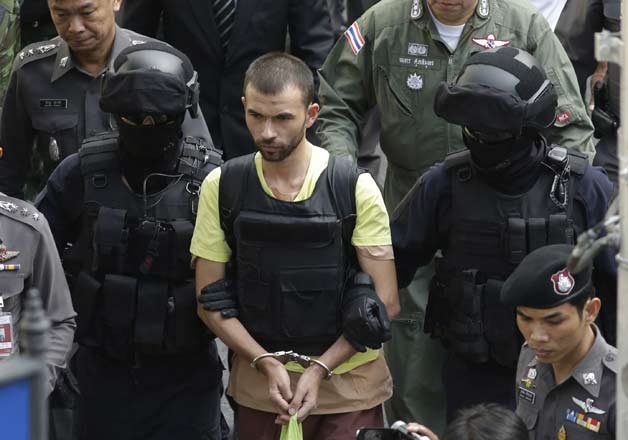Bangkok: Thai police said on Saturday that two men who were arrested in connection with August's deadly Bangkok bombing were the ones who carried out the attack and that authorities have gathered enough evidence to prosecute them.
Authorities are confident that the two men in custody, identified as Adem Karadag and Mieraili Yusufu, are responsible for the bombing at the Erawan Shrine on Aug. 17 that killed 20 people and injured more than 120, said National Police Chief Somyot Poomphanmuang. Police are seeking at least 15 other people they believe are tied to the case.
Police have said the motive for the attack was revenge by a people smuggling network against Thai authorities for breaking up their operation.
"Today, police are confident Adem and Yusufu are the real attackers," Somyot told reporters. "Adem is the yellow-shirted man who planted the bomb. Yusufu is the one who exploded the bomb."
Also Read: Bangkok blast culprit in custody: Police
Somyot said the case against them was supported by closed-circuit television footage, witnesses, DNA matching and physical evidence. He said the two men also had offered confessions.
Police on Saturday had the two carry out a reenactment of the bombing at the crime scene, as well as their getaway. Such reenactments are a routine police procedure in Thailand.
Police spokesman Prawut Thavornsiri announced late Friday that arrest warrants had been issued for a total of 17 people believed to be linked to the case.
With the new police findings that the two arrested men were believed to have actually carried out the bombing, the charges against them — previously involving the possession of military materials and explosive substances — were upgraded to murder, attempted murder and conspiracy to use explosives to kill, Prawut said.
Somyot said the strength of the evidence had forced the two suspects to confess. He described the police investigation as complete now that the two alleged bombers had been identified.
However, many questions remain unanswered about the case. Police have not detailed what action triggered the alleged violent revenge, and Somyot suggested Saturday that the people smugglers "might have hired" another group of people to carry out the attack. The names and nationalities of some of the others being sought are still unknown.
Even the two arrested men's true identities remain uncertain. Adem Karadag was arrested when police raided an apartment in Bangkok on Aug. 29, where they also found bomb-making materials and a large quantity of fake passports, including a bogus Turkish passport carrying the photo of the suspect and the name Adem Karadag.
His lawyer claims he is Turkish, but that his real name is Bilal Mohammed and that he was only seeking a job in the region. Karadag is the man in a yellow T-shirt who police say video footage showed planting the bomb at the shrine.
Mieraili Yusufu was the name on a Chinese passport carried by a suspect arrested Sept. 1 in eastern Thailand near the Cambodian border. Police said his fingerprints matched those found on a bottle containing bomb-making material found in a raided apartment.
The passport, verified as real, identified him as being from China's western Xinjiang region. That fact, and his name, strongly suggested he is a member of China's Uighur ethnic minority.
Early speculation about the bombing suggested it might be the work of Uighur separatists who were angry that Thailand in July forcibly repatriated more than 100 Uighurs to China, where it is feared they face persecution. The theory was bolstered by the fact that the Erawan Shrine is popular among Chinese tourists, who figured prominently among the victims of the bombing.
Thai officials, who insist the attack had no political element to it, have conceded that the gang worked to smuggle Uighurs (pronounced WEE-gurs) out of China. At least four of the suspects still at large have been tentatively identified as Turkish. This also ties the case to the smuggling of Uighurs, who often emigrate to Turkey, with which they have an ethnic kinship.

